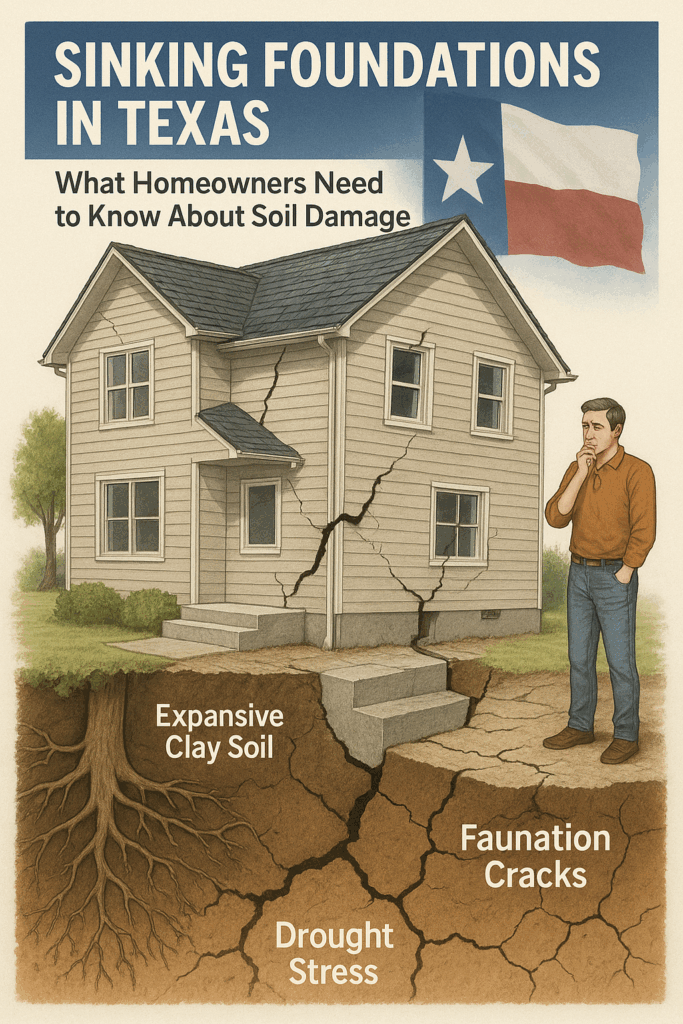
If you’re a homeowner in Texas, especially in cities like Dallas, Houston, Austin, San Antonio, or Fort Worth, your home could be at risk of foundation damage caused by the soil beneath it. Many homes in the Lone Star State are built on expansive clay soil, which expands and contracts dramatically with changing moisture levels. These shifts can cause your home’s foundation to sink, crack, and become unstable over time.
In this article, we’ll explore what causes foundations to sink in Texas, how to recognize early warning signs, and what steps you can take to protect your home from costly damage.
What Causes Foundations to Sink in Texas?
Understanding Expansive Clay Soil
A large portion of Texas is covered by expansive clay soil—especially in North Texas (Dallas–Fort Worth), Central Texas (Austin), and Southeast Texas (Houston). This soil type expands significantly when wet and contracts during dry periods. This repeated swelling and shrinking puts pressure on your home’s foundation, causing it to shift, crack, or even sink unevenly.
Seasonal Weather and Moisture Changes
Texas weather is notorious for its extremes. Long, hot summers followed by flash floods or sudden heavy rains are common in areas like Houston, San Antonio, and Dallas. These dramatic moisture swings cause the clay soil to expand and contract, which leads to foundation movement. Over time, this stress results in structural instability.
Poor Drainage Around Your Home
In neighborhoods throughout Fort Worth, Austin, and East Dallas, poor drainage can lead to excessive moisture around the foundation. When water pools near your home, it weakens the soil and increases the risk of erosion, causing sections of the foundation to sink or settle unevenly.
Warning Signs of a Sinking Foundation
Knowing what to look for can help you catch foundation issues early—before the damage becomes extensive and expensive.
Cracks in Walls, Floors, and Ceilings
Homeowners in Houston, Plano, and Cedar Park often report diagonal cracks in drywall or visible splits in concrete slabs. These are common signs of soil movement underneath the home.
Uneven or Sloping Floors
If you feel like you’re walking downhill in your living room—or notice a distinct slope in your flooring—foundation settlement is likely to blame. This is frequently reported in Austin and Dallas homes built on clay-heavy soil.
Doors and Windows That Stick
Sticking doors and windows can signal a shifting foundation that has caused the framing to twist or warp. This is one of the earliest and most overlooked symptoms seen in homes across San Antonio, Katy, and Fort Worth.
How Texas Soil Damages Home Foundations
Soil Expansion and Contraction
In cities like Austin and Dallas, the constant wet-dry cycle causes soil under your home to grow and shrink repeatedly. This fluctuation leads to uneven pressure, forcing parts of the foundation to lift or drop—resulting in cracks, tilting, or full-on sinking.
Soil Erosion and Washouts
Heavy rains, especially in Houston and South Texas, can cause the soil beneath your foundation to erode. As soil washes away, it leaves voids that compromise the structural integrity of your home, leading to settlement or collapse if left unchecked.
What Texas Homeowners Can Do to Prevent Foundation Damage
Soil Testing and Site Evaluation
Before building a new home or adding an extension in areas like Dallas, San Antonio, or Georgetown, it’s smart to conduct a geotechnical soil analysis. This can help engineers design a foundation that withstands the specific soil conditions on your lot.
Proper Drainage and Gutter Maintenance
Keeping water away from your foundation is critical. Whether you live in Fort Worth suburbs or Downtown Austin, make sure your gutters are clean, downspouts extend at least 4–6 feet from your home, and your yard is properly graded to slope water away from the house.
When to Call a Foundation Repair Expert
If you notice early warning signs—like cracking, sloping, or sticking doors—contact a local foundation repair company. Many professionals in Dallas, Houston, and Austin offer free inspections. Prompt attention can prevent further damage and save you thousands in long-term repairs.
Conclusion: Protect Your Texas Home from Sinking Foundation Issues
Foundation issues in Texas are often caused by soil movement, drainage problems, and extreme weather conditions. Whether you’re in Houston, Dallas, Austin, or beyond, it’s important to stay vigilant for early warning signs and act quickly when problems arise.
By understanding the relationship between Texas soil and foundation damage, performing regular inspections, and ensuring proper water management, you can protect your home from the dangers of sinking foundations.